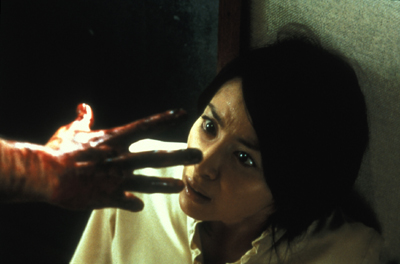FILM-FORWARD.COMReviews of Recent Independent, Foreign, & Documentary Films in Theaters and DVD/Home Video
JU-ON
What makes classics like The Evil Dead (1983) and Halloween (1978) so
memorable and continually frightening is the way their narratives both visually and emotionally
play your senses like a piano. Each time you watch them, they play a different tune.
Ju-on, with a strategy based solely on the visually frightening, knows exactly which notes
it wants to hit and goes charging for them without fear of mediocrity. Home-care worker
Rika (Megumi Okina) arrives at the disheveled home of a mute, bed-ridden old woman. Behind a
duct-taped closet Rika finds a little boy who turns out to be the missing son of a woman
murdered by her husband in the same house years earlier. The boy (usually in all-white makeup)
is just one of many forms of the Ju-on, a curse created in the aftermath when someone dies with
great anger. As the film progresses, the curse can be represented as a black cat, a silhouette of
dark mist, or the possessed form of a past victim. So much emphasis is placed on the horrors
trapped within this house that it is confusing when the Ju-on follows a character to her home or
claims the life of someone who has never even been to its resting place. Chronologically,
Ju-on bounces back and forth days and years, preventing the audience from gaining a
psychological sense of any of the characters. And unlike the wildly successful American remake of the Japanese thriller
The Ring (2002), this film never delivers that one unforgettable horrifying moment to
keep you awake when you get home. It goes for one nonsensical scare after another, and in the
process, sacrifices its ability to be taken seriously. And what is left is a horror
movie dampened by overcompensating. Michael Belkewitch
|